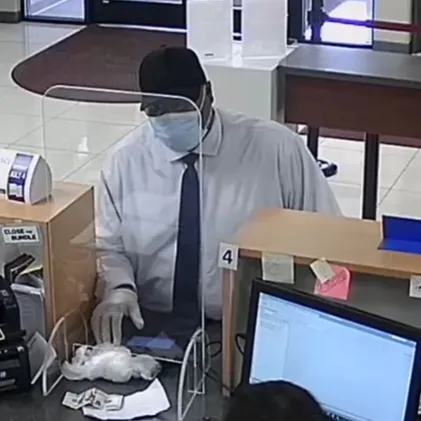
Level 1:
A man from Baltimore has been given a prison sentence for robbing a bank. Nacoe Ray Brown took almost $4,300 from a bank in Florida in June last year. He said he needed the money to finish making a movie. But prosecutors say he had already robbed three other banks before. Brown pleaded guilty to the charge in January and has now been sentenced to ten years in prison.
Level 2:
Nacoe Ray Brown, a man from Baltimore, has been sentenced to ten years in prison for robbing a bank in Florida. He took almost $4,300 in cash last year, claiming he needed the money to complete his movie. However, prosecutors revealed that he had already robbed three other banks in the past. In January, Brown admitted to the charge of bank robbery and was sentenced accordingly. This case highlights the importance of finding legal ways to finance film projects rather than resorting to criminal activities.
Full Story:
A filmmaker who robbed a bank to fund his movie has been sentenced to ten years in prison, according to reports. Nacoe Ray Brown of Baltimore was given the sentence after taking nearly $4,300 from the McCoy Federal Credit Union in Belle Isle, Florida last June.
Brown, 55, pleaded guilty in January to the robbery charge. Although he cited his desire to complete filming his movie, prosecutors allege that Brown had previously been convicted of three other bank robberies, making his claim dubious.
The defendant’s previous convictions, however, could not be used against him at his trial due to Florida’s rules on prior convictions. He also received credit for time served during the trial.
Brown reportedly told authorities after his arrest that he was an independent filmmaker who needed money to finish his film, which he called “Now or Never.” However, it is unclear whether such a project actually existed or if it was just a ploy to get away with the robbery.
According to The Insider, a news outlet covering crime and justice, Brown handed one of the bank tellers a note stating that he had a weapon and demanding cash. He then fled the scene, but police later arrested him based on eyewitness accounts and surveillance footage.
During sentencing, U.S. District Judge Carlos E. Mendoza pointed out that the defendant had failed to learn from his past mistakes, saying that “He keeps going back to what he knows, and that’s robbing banks.”
Brown’s criminal history includes two convictions for bank robbery in Maryland in the 1990s and another in Delaware in 2006. He had been released early from prison following his third conviction, raising questions about the effectiveness of the justice system’s handling of repeat offenders.
The case highlights the desperate measures some filmmakers take to get their projects off the ground. While many turn to crowdfunding websites like Kickstarter or Indiegogo, others resort to more extreme methods like robbing banks.
However, such actions can have severe consequences not only for the filmmakers themselves but also for their victims. In this case, Brown’s robbery caused distress and trauma to the bank tellers who were threatened and forced to hand over cash against their will.
In conclusion, the sentencing of Nacoe Ray Brown serves as a reminder that crime does not pay, and that filmmakers should seek legal and ethical means of financing their projects. The justice system must also do more to address the root causes of repeat offending and provide effective rehabilitation measures to prevent individuals from committing crimes in the future.
Questions:
Who is Nacoe Ray Brown and what was he sentenced for?
What accusations did prosecutors make about Brown’s previous bank robbery convictions?
What did Brown allegedly claim he needed the money for?
How does this case highlight the importance of finding legal ways to finance film projects?
Do you think the justice system should do more to address the root causes of repeat offending?
Fill in the Blanks:
robbery, convictions, prosecutors, rehabilitation
Brown, 55, pleaded guilty in January to the ________ charge.
Although he cited his desire to complete filming his movie, ________ allege that Brown had previously been convicted of three other bank robberies, making his claim dubious.
The defendant’s previous ________, however, could not be used against him at his trial due to Florida’s rules on prior convictions.
The justice system must also do more to address the root causes of repeat offending and provide effective ________ measures to prevent individuals from committing crimes in the future.
Vocabulary:
Convictions - formal declarations of guilt made by a court of law
Prosecutors - legal professionals who represent the government in criminal cases
Robbery - the act of taking someone’s property using force or the threat of force
Credit union - a nonprofit financial institution owned and controlled by its members, typically offering lower interest rates on loans and higher interest rates on deposits compared to for-profit banks
Ethics - moral principles that guide behavior and decision-making
Rehabilitation - the process of helping individuals who have engaged in criminal activity to become law-abiding citizens once again
Image From (Department of Justice)




